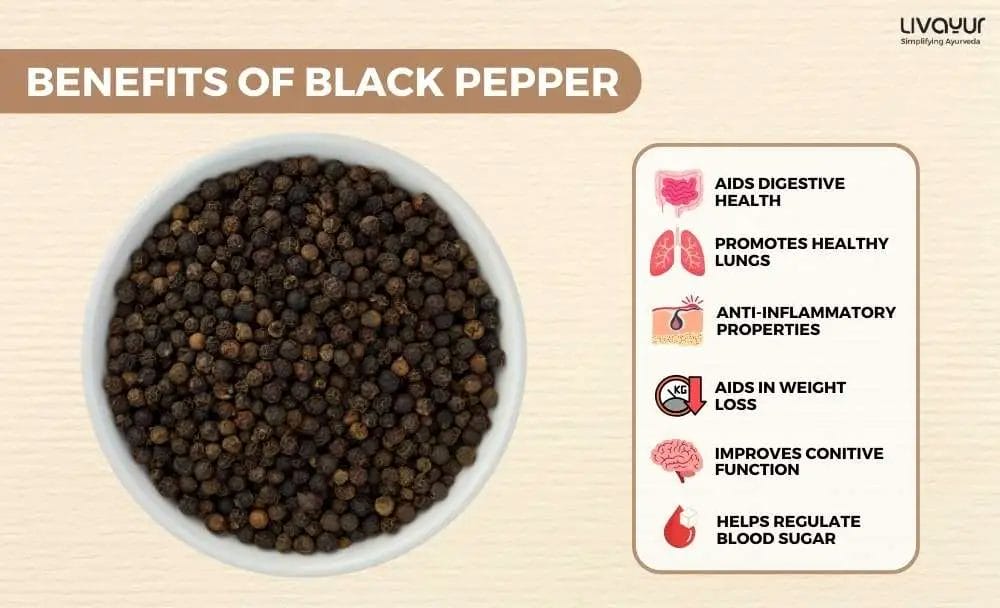
Do you love to sprinkle your butter toasts with the flavourful black pepper? A dash of black pepper can indeed add a fiery note to your dishes! Black pepper, known as Kali Mirch in Hindi, is a widely used spice that not only improves the taste of our food but also offers several surprising black pepper benefits. Known for its unique flavor and strong aroma, black pepper or Kali mirch has been used in Ayurvedic medicine for several centuries. In this article, we will learn about the 15 powerful health benefits of black pepper and understand how it can impact our overall well-being.
Black pepper’s nutritional value
Black pepper uses, and benefits come from the nutrients in black pepper. The chart below shows the various nutrients in 1 tablespoon, i.e., 6.9 grams of black pepper, and their value.
| Nutrients | Value |
| Calories | 17 Kcal |
| Carbohydrates | 4.4 g |
| Fat | 0.2 g |
| Fiber | 1.8 g |
| Protein | 0.7 g |
| Vitamin K | 11.3 mg |
| Potassium | 91.7 mg |
| Calcium | 30.6 mg |
| Iron | 0.7 mg |
| Magnesium | 11.8 mg |
| Sodium | 1.38 mg |
Black pepper benefits for health
1. Digestive Health
Primary Benefit: Black pepper can stimulate the production of vital digestive enzymes, aiding in digestion and alleviating digestive discomfort. [1]
Secondary Benefit: It helps reduce bloating and flatulence and promotes a healthy gut function.
2. Weight Management
Primary Benefit: Black pepper contains a vital compound piperine, which may support weight management by increasing metabolism and reducing fat accumulation. [7]
Secondary Benefit: It aids in curbing appetite, preventing overeating, and making the weight loss journey quite easy.
3. Respiratory Health
Primary Benefit: The expectorant properties of black pepper can help alleviate chest congestion and promote healthy lung function. [5]
Secondary Benefit: It may offer relief from cough, cold, asthma, and other respiratory issues.
4. Anti-inflammatory Properties
Primary Benefit:
The compound piperine in black pepper exhibits excellent anti-inflammatory capacity, helping reduce inflammation in the body. This is one of the most notable benefits of black pepper. [1]
Secondary Benefit: It may support the management of inflammatory issues like joint pain, arthritis, and inflammatory diseases.
5. Cognitive Function
Primary Benefit: Black pepper may improve your brain’s cognitive function, memory, and concentration. [4]
Secondary Benefit: It may lower the risk of fatal neurodegenerative diseases like Alzheimer’s disease and Parkinson’s disease.
6. Antioxidant Activity
Primary Benefit: Black pepper has high amounts of antioxidants that help counter the damage caused by free radicals and shield the body against oxidative stress. [1]
Secondary Benefit: It may lead to overall cellular health, delaying the aging process and protecting an individual against chronic diseases.
7. Blood Sugar Regulation
Primary Benefit: Studies show that black pepper may help regulate your blood sugar or blood glucose levels, making it helpful for diabetics. [8]
Secondary Benefit: It may improve insulin sensitivity and reduce the risk of diabetes-related complications.
8. Skin Health
Primary Benefit: The potent antimicrobial as well as anti-inflammatory properties of this incredible spice make it useful in managing skin issues like acne, eczema, and dermatitis. [2]
Secondary Benefit: It may help improve the skin tone, remove blemishes, and promote overall skin health.
9. Heart Health
Primary Benefit: One of the health benefits of black pepper is that it may promote heart health by improving good cholesterol or HDL levels and reducing the risk of cardiovascular diseases. [1]
Secondary Benefit: It supports healthy blood pressure levels and promotes healthy blood flow and circulation.
10. Nutrient Absorption
Primary Benefit: The piperine in black pepper supports the bioavailability as well as absorption of vital nutrients.
Secondary Benefit: With the support of black pepper, the body can effectively use the nutrients from food, promoting overall well-being.
11. Oral Health
Primary Benefit: Black pepper has potent antimicrobial properties that can help in maintaining optimum oral hygiene and keeping dental issues like gum disease and bad breath at bay. [6]
Secondary Benefit: It may control tooth decay and promote a healthy mouth environment.
12. Anti-cancer Potential
Primary Benefit: Research suggests that black pepper is anti-cancerous and may help in preventing certain types of cancer. [3], [4]
Secondary Benefit: It may check the growth of malignant cells and reduce the risk of tumor formation.
13. Eye Health
Primary Benefit: Carotenoids in black pepper may improve your eyesight and help in preventing age-related cataracts and macular degeneration.
Secondary Benefit: It can protect your eyes against oxidative stress and promote optimal vision. [9]
14. Detoxification
Primary Benefit: Black pepper’s diaphoretic properties can promote sweating and support the detoxification process, eliminating toxins from the body.
Secondary Benefit: It may prevent water retention, purify the blood, and support overall detoxification.
15. Immune System Support
Primary Benefit: Black pepper has an immune power-stimulating capacity that can help strengthen one’s immune system and protect against infections.
Secondary Benefit: It helps in strengthening the body’s defense mechanisms, enhancing resistance to common illnesses.
Black pepper side effects
Black pepper is usually safe when used for a short term. However, excessive use of black pepper and using black people for a long period may result in the following side effects:
- Gastrointestinal issues like heartburn, indigestion, and stomach upset
- Some people may be allergic to black pepper and develop severe respiratory issues from taking it. Wheezing, shortness of breath, coughing, and anaphylaxis may be experienced by people who are allergic to black pepper. [10]
Black pepper allergies may also cause issues like hives, eczema-like skin reactions, and allergic dermatitis.
- Too much black pepper consumption may leave a burning aftertaste in the mouth.
- If accidentally black pepper enters the lungs, it may even cause death!
Black pepper names
Black pepper is known by several other names, such as:
- Pippali (in Sanskrit)
- Gol morich (in Bengali)
- Kali Mirch (in Hindi)
- Kurumilagu (in Tamil)
- Kurumulaku (in Malayalam)
- Hu Jiao (Chinese)
- Pimienta (in Spanish)
- Fulful (in Arabic)
- Pepe (in Italian)
- Pfeffer (in German)
- Poivre (French)
Black pepper interesting facts
- Did you know that black pepper is not a spice but a botanical herb?
- When the Egyptian pharaoh was converted into a mummy, black pepper powder was placed in his nostrils.
- The application of black pepper in Indian cuisine started nearly 4000 years ago.
- Black pepper is harvested in the form of green grains, which are then thoroughly sun-dried.
Some fabulous black pepper recipes
- Aaloo kali mirch
Diced potatoes stir-fried in loads of butter and with black pepper taste heavenly. You may also add minced garlic and chopped onions to this recipe.
- Chicken kali mirch
Chicken kali mirch is a dry chicken preparation consisting of boneless chicken cooked in yogurt with lots of black pepper. This is a highly aromatic murg recipe.
- Paneer Kali mirch
This luxurious and creamiest paneer recipe cooked in white gravy with lots of black pepper powder and seasoned with aromatic spices can steal your heart!
FAQs
1. Is black pepper safe?
Yes, a moderate intake of black pepper is generally safe. However, individuals with specific medical conditions or those with allergies must consult with a healthcare professional before using it therapeutically.
2. How to store black pepper?
Black pepper must be stored in airtight glass containers away from direct heat and light. Whole black peppercorns may survive a lifetime, but the powdered form can last only up to three months.
3. Can black pepper be used as a topical emollient for skin issues?
Yes, the essential oil extracted from black pepper can be used to manage skin conditions. However, diluting it properly and performing a patch test before applying it to the skin is important.
4. Is black pepper native to India?
Yes, black pepper is native to India’s Malabar region.
5. Can black pepper interact with medicines?
Yes, black pepper may potentially interact with certain medications, especially the ones metabolized by your liver. It contains compounds that can leave an impact on drug metabolism enzymes. If you are on certain medications, it is advised to consult with a doctor or pharmacist to determine if there could be any unwanted interactions.
Conclusion
In conclusion, black pepper offers a vast array of amazing health benefits, ranging from digestive health promotion and weight management to cognitive function and immune support. The benefits of black pepper make it a much-coveted ingredient in Ayurveda. Incorporating black pepper into our everyday diet can boost our overall well-being. However, it is essential to keep in mind that these benefits are based on traditional black pepper usage and limited scientific studies. As with any herbal remedy, it is advisable to discuss it with a healthcare professional before using black pepper for therapeutic purposes.
Disclaimer
The information provided here is for general information and not meant to substitute any medical advice. Please consult your doctor for appropriate medical consultation.
References
- Black pepper dietary supplementation increases high-density lipoprotein (HDL) levels in pigs
- Antimicrobial and Antiproliferative Activities of Black Pepper (Piper nigrum L.) Essential Oil and Oleoresin
- Piperine, a Bioactive Component of Pepper Spice Exerts Therapeutic Effects on Androgen Dependent and Androgen Independent Prostate Cancer Cells
- Black Pepper and Health Claims: A Comprehensive Treatise
- Potential of black pepper as a functional food for treatment of airways disorders
- Antioxidant, antibacterial, and degradation Streptococcus mutans biofilms activities of black pepper (Piper nigrum) seed extract
- Anti-Obesity Properties of Black Pepper (Piper nigrum): Completing Puzzle using Computational Analysis
- Piperine, a Natural Compound from Black Pepper, Controls Blood Sugar Level Through Insulin Receptor and GLUT-2 Mediated Signaling in Hepatocytes
- Piperine: A Potent Antioxidant from Black Pepper in Treatment of Glucose-Induced Cataract
- A Rare Case of Multiple Severe Anaphylaxis Caused by Thyme, Black Pepper, Wasp and Honey
















